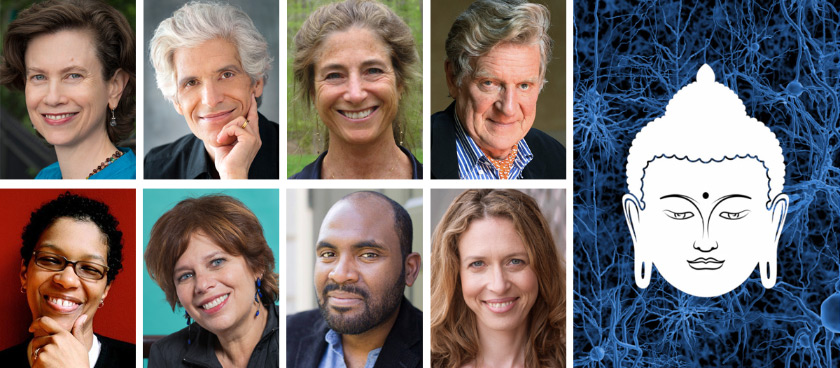By Fiona Brandon

2019–2020 San Francisco faculty include Pilar Jennings, Joe Loizzo, Tara Brach, Robert Thurman, Rev. angel Kyodo williams, Diana Fosha, Lama Rod Owens, and Fiona Brandon.
Contemplative Psychotherapy Program students were challenged by visiting faculty Mariana Caplan to, “Think of a time when you rejected a part of yourself thinking it was keeping you from deeper transformation. And see if you can call that part back. And how could you use it to deepen your practice?” What a dare! And what an inroad to the truth about why many of us stay in a state of suffering. Instead of ostracizing parts of ourselves, what if we use them as a way to create profound psychological and spiritual transformation? Is that possible? Absolutely.
The CPP Compassion Year, beginning September 20th, teaches how to use compassion practices, and the analytic wisdom of emptiness, to relate to the parts of ourselves we have deemed unacceptable and how to ultimately extinguish the cycle of stress and trauma these aspects are born from.
Compassion is essential to building emotional, mental and social resiliency. When we engage in a compassionate dialogue with our shame, self-doubt, rage, low self-esteem, etc. we build a powerful nurturing relational network of acceptance and kindness towards ourselves and others.
Tara Brach, during her Compassion Year lecture explained, “[Our] Ouch moment is the beginning of nurture. If someone can feel directly into the suffering, that is the gateway to compassion…[The] Alchemy of self compassion is getting that we are suffering!” Tara encouraged students to dialogue with their suffering and ask it, “What do you most need? How do you want me to be with you right now?” This kind of caring exchange with our suffering amplifies a positive sense of self because we are actively pursuing and cultivating a kind and thoughtful relationship with our edges.
Chris Germer, in his talk to CPP students, encouraged self compassion because with it “[We] have more energy to overcome mistakes, [we are] more motivated to get through mistakes and [we] are willing to say when we’ve made a mistake…Self compassion is a powerful factor in resiliency..[It] is an authentic inner support.” Chris also shared in his lecture that self compassion builds self kindness instead of self-criticism; a sense of common humanity instead of self isolation; and an internal spacious loving awareness instead of self absorption.
When the powerful nurturing of compassion is coupled with the potent understanding of emptiness, our minds feel a pronounced relief from suffering, and we become more caring, flexible and discerning. Emptiness teaches that our minds can be free because of our ability to unlearn problematic conditioned responses to life and replace them with healthy relating patterns.
Core faculty member Pilar Jennings asked a recent Compassion Year cohort, “What is it that generates suffering?…Usually [we] find a rigid concept of personhood, others and relationship. We feel boxed in.” Pilar explains that suffering can come from the perception of ourselves, and others, as limited and without access to greater potential. Pilar continued, “These teachings [on emptiness] are…saying we are actively co-creating each other all the time. Nothing is fixed. Nothing is unchangeable.” If we accept that we are co-creating each other all the time then we are no longer trapped in a rigid narrative about who we are, our potential and the potential of others. Instead our ability to unlearn anything gives us the freedom to consciously choose who we want to be and how we want to relate to others! We can let go of negative habits and abide in the care and wisdom of compassion and emptiness.
For those who are interested in playing truth or dare with the teachings of compassion and emptiness, I encourage you to apply to this year’s CPP Compassion Year. Using the practices of equalizing, tonglen, giving and taking, 5 keys meditation, role modeling and mahamudra, students will be empowered by compassion and emptiness to let go of identifying with their limits and instead open into their fullest vibrant and dynamic relational potential.
2019–2020 Compassion Year Details
The 2019–2020 Compassion Year faculty includes Joe Loizzo, Pilar Jennings, Robert Thurman, Tara Brach, Diana Fosha, Scott Tusa, Rev. angel Kyodo williams, Ethan Nichtern, Lama Rod Owens, Zoran Josipovic, and others. Or view all Contemplative Psychotherapy Program faculty.
Opening retreat with Dr. Joe Loizzo, Founder and Director of the Nalanda Institute for Contemplative Science, will be held September 20–22, 2019 at the San Francisco Zen Center.
Intersession retreat with Dr. Pilar Jennings, Core faculty member, will take place February 22–23, 2020 at the San Francisco Zen Center.
Bi-monthly video conference meetings are held Wednesday mornings 9:00am – 10:30am PT September 2019 – May 2020.
Quick Links:
Get in-depth details about the 2019–2020 Compassion Year of the Contemplative Psychotherapy Program in San Francisco including our FAQ.
Applications are open now and enrollment is limited so join us now!
Please feel free to contact San Francisco Program Director, Fiona Brandon, at fiona@nalandainstitute.org with any specific questions.
